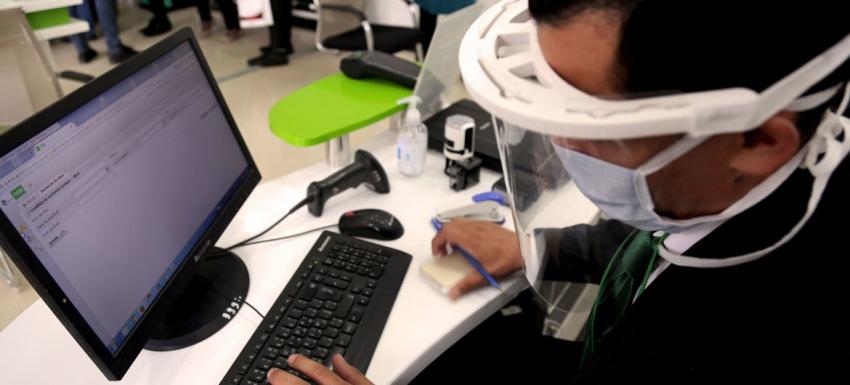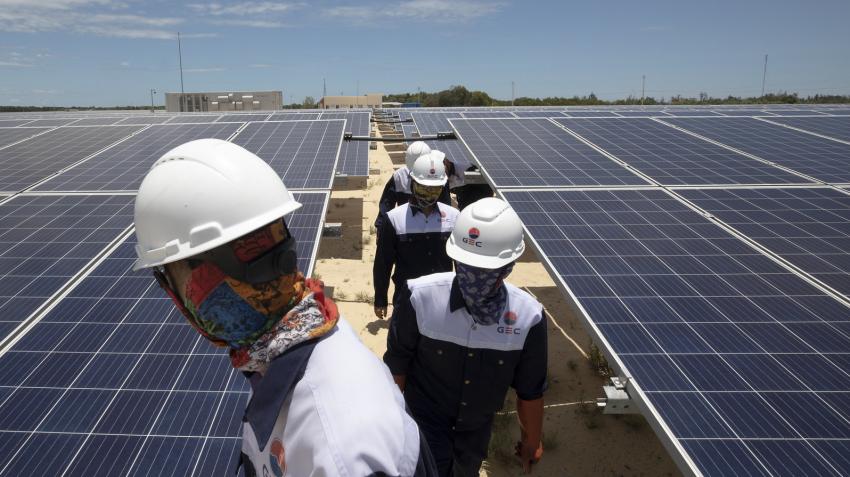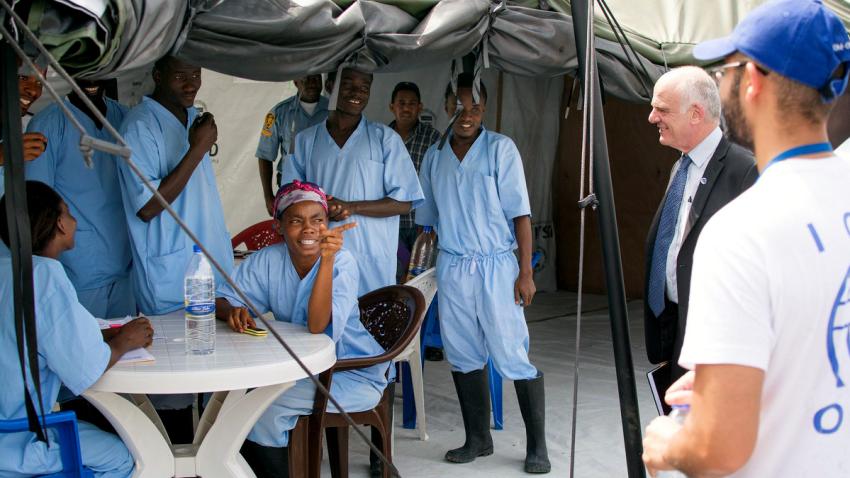“Now more than ever, as big decisions are made about our future, companies need to address environmental, social and governance risks holistically and move beyond business-as-usual.” - UN Secretary-General Antonio Guterres
24 June 2020 – Smart businesspeople never let a crisis go to waste. As profits plummet and operations shutter due to the COVID-19 pandemic, the United Nations’ corporate partners are capitalizing on the downturn to build a safer, greener, fairer and more resilient global economy.
The UN Global Compact, the world’s largest corporate sustainability initiative, recently made a special appeal for private sector leaders to work together to control the coronavirus outbreak and operate in ways that align with its 10 business principles on human rights, labour, environment and anti-corruption.
With UN economists estimating that the pandemic could cost the global economy more than $1 trillion, joint action is critical to spur recovery and help workers, companies and communities struggling to stay afloat. Collective efforts are also vital to reduce entrenched inequalities and advance the 17 Sustainable Development Goals, the UN’s shared blueprint for achieving peace and prosperity across the planet.
“Now more than ever, as big decisions are made about our future, companies need to address environmental, social and governance risks holistically and move beyond business-as-usual,” UN Secretary-General Antonio Guterres said at the Global Compact Leaders Summit, which met 15-16 June under the theme “Recover Better, Recover Stronger, Recover Together”.
Now more than ever, companies need to address environmental, social and governance risks and move beyond business-as-usual, says @UN Secretary-General @antonioguterres at the UN @globalcompact #LeadersSummit.
— UN Global Compact (@globalcompact) June 15, 2020
Join this virtual event now: https://t.co/1RNtjLilnp #UnitingBusiness pic.twitter.com/WjMxaSs1CD
CEOs take action
Chief executives around the world are heeding that call. The UN Global Compact invited them to share their ideas, advice and experience to help others weather the COVID-19 crisis and prepare for future storms.
In a series of videos, several shed light on their strategies for keeping workers healthy and customers satisfied, and for better equipping operations to address climate change, novel diseases and future emergencies.

“When the outbreak happened, the first thing we did was to ensure the safety of our employees,” said Li Zhenguo, Founder and President of LONGI Green Energy, a solar technology manufacturer in China. “We conducted regular temperature tests and sanitized all our office buildings.”
Solidarity with customers
“At the same time, we stood in solidarity with our customers,” Mr. Li said. “When the epidemic’s spread became severe, we delivered medical kits to them. Some customers faced difficulties with deliveries, so we adjusted our production plans.”
The company joined the Global Compact last year to help advance the UN’s goal of bolstering the share of clean energy in the global energy mix. Today, it is working to decentralize and diversify production – an essential step for keeping operations running when unexpected events disrupt transport routes or the flow of raw materials and finished products.
“The most important factors for us to react in emergencies and enable our company to develop sustainably, is that the supply chain and the business need to be decentralized, while maintaining a healthy and stable financial status,” Mr. Li said.
NR Instant Produce Company, a manufacturer of plant-based sauces, condiments and other packaged food in Thailand, sees the COVID-19 pandemic as a catalyst for a potentially greener economic infrastructure.
“The net beneficiary of this crisis is our planet,” said CEO Dan Pathomvanich. “Our planet is again breathing and replenishing globally.”
The company is among 155 multinational firms that have committed to science-based emissions reduction targets and urged Governments to focus COVID-19 economic stimulus packages, with recovery efforts geared towards reducing vulnerability to disasters, creating good jobs, lowering emissions and ensuring clean air.
Given the origin of the coronavirus in a seafood market, a plant-based diet is more important than ever, Mr. Pathomvanich said. Research at his company is underway to develop inexpensive nutrient-rich food products from plants for low-income populations.
“We're looking at supporting not just our farmers, but our communities with affordable quality products at heavily reduced prices,” he said. “And we're trying to work with organizations to get these products to frontline service workers.”
Shifting gears
Companies are also repurposing production lines to churn out equipment and supplies essential for fighting COVID-19 as a way to maintain some output and revenue as regular orders dry up.
For Sapphire Textile Mills in Pakistan, producing personal protective equipment has been a lifeline amid major order cancellations and deferments from customers. The switch in production has enabled the company to retain employees and make payroll.
“While we have struggled for regular business, we have diverted some of our production resources towards producing face masks and hospital gowns, working with our European and American customers to meet the safety standards required,” said Nabeel Abdullah, its Chief Operating Officer.

Shionogi & Co, a pharmaceutical firm in Japan specializing in treatment for infectious disease, has swiftly changed its focus to COVID-19. “We're working on development of a prophylactic vaccine and aiming to initiate clinical studies by the end of 2020,” said Isao Teshirogi, President and CEO.
Soon the company will supply antibody test kits, while potential drug candidates to fight the disease have already been identified. “It is difficult to predict when the next pandemic might occur. Therefore, it is critical for us to maintain our research and development capabilities, as well as to support awareness of the importance of drug stock-piling.”
Schneider Electric in France, which provides energy and automation solutions for various industries, has partnered with local firms to ramp up and expedite production of respirators. Chairman and CEO Jean-Pascal Tricoire says the company is creating a foundation focused on helping vulnerable staff, business partners and local populations that have been adversely impacted by the pandemic.
“This crisis brings us back together much closer to our larger ecosystem, our partners, our suppliers and the communities around us. And it creates ties of solidarity and cooperation that were never existing before,” Mr. Tricoire said.
Educating workers about COVID-19, their rights and responsibilities
By educating workers about the virus and their rights, and involving them in the response, companies can also protect their bottom line.
Through a series of instructional videos, Buses Hualpén, a bus company in Chile, is teaching employees how the disease is contracted, its symptoms and treatment. In addition to temperature checks at the start of their shifts, workers are given hygiene kits of protective masks, eye shields and sanitizer gels. They also must follow strict protocols for sanitizing buses. A committee meets daily to handle virus-related emergencies.
“Safety is always our main priority,” said Daniel González Moisan, General Manager.
Robert Okine, CEO of Bewsys, a Ghana-based developer of information technologies to achieve the Sustainable Development Goals, said companies should continuously consult workers, using the Global Compact’s 10 principles as a guide.
“There is a need to be sensitive to the demographic groups that work in the business as the pandemic goes beyond health to affect our cultural and social lifestyle,” he said. “The result is a much better balance of cost and employee welfare.”
Bewsys has set up its mostly female staff to work remotely from home with flexible hours to attend to domestic responsibilities. In return, employees volunteer to divert their transport allowances to pay for mobile data, greatly reducing the company’s operating costs.
Quizrr, a Sweden-based creator of digital training apps on occupational health, safety and workers’ rights and responsibilities for global supply chains, has been offering free access to its online classes in Asian markets, including China and Thailand, since February.
“The landscape as we know it is shifting rapidly towards digital tools to secure basic human rights,” said CEO Erika Wennerström. “We wanted to ensure already vulnerable groups in society, like migrant workers and factory workers, were able to receive training during these extraordinary circumstances.”




